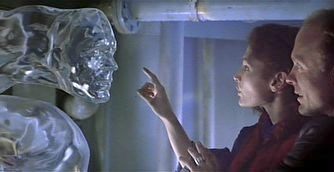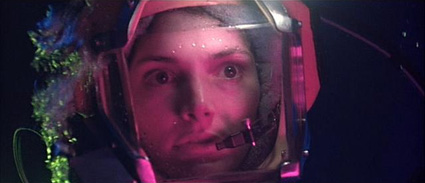|
In 1989, Terminator and Aliens creator James Cameron came along with the biggest budget ever-an approach he would continue to use with his next three films-and one of the most difficult shoots ever, giving us this sci-fi dramarama about being trapped on an underwater drilling platform with some slowly encrazifying military dude with a nuke. Unfortunately for James and his long-suffering cast, a glut of underwater thrillers hit around that time, and The Abyss ended up being just another one, losing several million bucks in the final tally. History has been kinder to it, though, than to Leviathan or Deep Star Six, and, like The Terminator before it, it got a new lease on life with not only the video release, but the specially-made "Director's Cut" that came out a few years later. The latter version received almost universal praise from fans and critics, so I'm going to be bold and just step up to the plate with this question: 
Am I the only one who thinks that the inclusion of friendly ETs in this film was utterly superfluous? Perhaps so. Nevertheless, this film could've been a nice Cold War drama without the danged aliens making so much as a cameo, which, for the first ninety minutes or so, is about all they do. Snip the rest and simply allow the human conflict to play out; there's plenty of it, and it's by far Cameron's most nerve-wracking work. The much-praised drowning sequence is truly grueling to watch, and the claustrophobic atmosphere exceeds that of Aliens, probably his best movie. This one could've replaced Aliens as his best work, frankly, if he'd maintained focus on the human drama. But the horribly awkward dog-leg turn at the end threw my suspension of disbelief right out the window and into a busy street full of unnecessarily heavy semis and a terribly wayward train. Sadly, the director's cut is even more egregious in this respect, with an entirely new plot line that had not really even been hinted at previously suddenly appearing and then being abruptly resolved within minutes, all but taking a fleet of backhoes to my already crushed and pitifully-bleeding suspension of disbelief. Another Architects of Fear we don't need. 
Some directors do a good job at incorporating a moral within their narrative, but Cameron isn't one of them (which his later film Titanic would prove once again.) His comments on human aggression and non-cooperation reduce to "people being mean bad! People saying 'I love you' to family good!" Frankly, most of us have figured that out independently. "Show, don't tell," is a technique Cameron has never seemed comfortable with, as if he doesn't trust his own ability as a director to convey the idea he wishes to promote without writing it on a baseball bat and clubbing you about the face with it. Good performances, photography, and effects aren't enough to save a potentially great movie about interpersonal conflict from the preachier aspects that, as the director's cut makes clear, were Cameron's most favorite parts of the story. Too bad. Someone should really do a Phantom Edit job on this film and remove the flopping, bloated goiter from the end of this movie. This will never happen, though, since no one else seems to have my particular gripes with the story. His explanation of some particularly bad science at the end also boils down to "Gronk no understand why we no get bends! Ahh, never mind! Bends stupid." Cameron has shown some impressive chunks of talent in the past, but, perhaps only coincidentally, with the coming of larger and and larger budgets, he's become more and more sloppy with the storytelling. He really ought to try and do a smaller-scale film again just to see if the old promise would once more see the light of day. He also ought to stop dropping his current girlfriend for his leading lady or co-writer on every goddamned film he makes, but that's a separate issue. -review by Matt Murray
|
|
||||||||